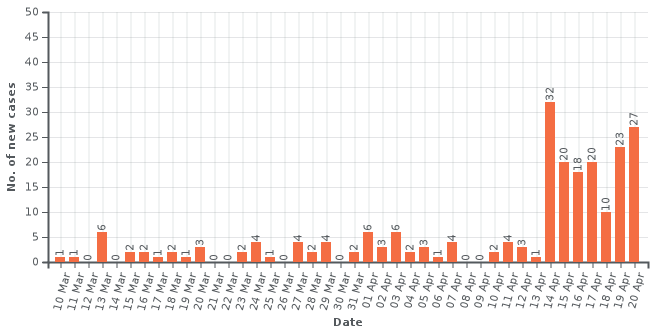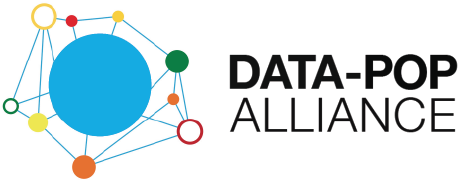JAMAICA
Information last updated: 22 April, 2020
- Total population: 3 M
- Population +65: 9%
- GDP Per Capita: 9,975 USD
- Informal employment: NA
- First registered case: 10 March
- Hospital beds: .70 (per 1,000 people)
Sources: TheWorld Bank and WHO (Population over 65 years old, Informal employment, GDP-PPP, Hospital beds).
Status
Quarantine for individuals with recent travel to hotspots, all-island curfew from 6:00pm – 6:00 am. Mandatory wearing of masks in public places.
Response set up and capacity
In Jamaica, the Government has spearheaded and coordinated the response against the Covid-19 pandemic. At the national level, the Prime Minister ordered closure of air & seaports, restricted movement of citizens, raising the threshold of public health resources, and implemented public awareness campaigns on Social Distancing and facts about the Coronavirus. The Jamaica Constabulary Force (Police Force) is the main driver in enforcing self quarantine, isolation, and restrictions on public gatherings. .
Stakeholder Mapping
Entities / Organizations
• Office of the Prime Minister
• Ministry of Finance & the Public Service
• Ministry of Health & Wellness
• Jamaica Constabulary Force
• National Health Fund
• Rural Agriculture Development Authority
• Ministry of Agriculture
Additional actors
• RJR Communications Groups
• Jamaica Public Service (JPS) Limited>br>
• Jamaica Information Service (JIS)
Mitigating factors - What is being done?
- March 12 – The Prime Minister, Most Hon. Andrew Holness, orders all primary and secondary schools closed for 14 days.
- March 13– the Prime Minister announces the invocation of special powers to combat further spread of COVID-19.
- March 17 – The Government of Jamaica issues work-from-home directives to non-essential workers in Jamaica. Additionally, the Hon. Nigel Clarke, Minister Of Finance And The Public Service issues a fiscal stimulus response package of $25 billion, the largest fiscal stimulus in Jamaica’s history. He also announced a rollback of the General Consumption Tax (GCT) from 16.5% to 14%.
- March 19 – The Government of Jamaica places the community of Corn Piece in Hayes District, Clarendon under quarantine.
- March 20 – The Government of Jamaica announces that all sea and airports will be closed to incoming traffic for a period of 14 days effective March 21 .
- March 23 – The Government imposes stay-at-home orders for all Jamaican citizens and residents 75 years and older for a period of 14 days; the order comes into effect on March 25.
- March 25 – The Minister of Finance and Public Service announces in Parliament the multi-billion-dollar COVID-19 Allocation of Resources for Employees (CARE) Programme.
- March 30 – The Government announces an all-island curfew commencing on April 1.
- April 3 – The Prime Minister confirms that out of the 7,000 individuals who have arrived in Jamaica between the 18 and 24 of March, 4,500 have failed to report to the Ministry of Health and Wellness (MoHW).
- April 5 – The Minister of Culture, Sports, Entertainment and Gender Affairs announces a telethon with the aims of raising US$10 million to fund the government’s COVID-19 response will take place on 12 April.
- April 6 – Jamaica’s Chief Medical Officer issues guidelines on the usage of masks following similar announcements by the United States’ CDC and the WHO.
- April 8 – The Prime Minister announces that the nightly curfew in place since early April will be extended to 21 April.
- April 9 – The COVID-19 Allocation of Resources for Employees (CARE) Programme announced on the 25th of March begins accepting applications.
- April 13 – The Minister of Health and Wellness announces the operation and deployment of new mobile testing units.
- April 14 – The Prime Minister announces a complete lockdown for the parish of St Catherine, the most populous parish of Jamaica for seven days from 5 am Wednesday, April 15 to 5 am Wednesday, April 22, 2020, to slow the spread of COVID-19.
- April 17 – The quarantine imposed on the Corn Piece Settlement in Clarendon is lifted.
- April 21 – The Prime Minister announces a tightening of the island wide curfew as the country continues to tackle the coronavirus (COVID-19) pandemic. Mandatory wearing of masks in public places. Community spread is reported to have started on this date.
Risks, vulnerabilities, obstacles
The risks of the virus spreading in Jamaica is considered high due to cultural norms and expressions which promote touching and physical interactions. The current growth projection of the number of new cases is expected to be exponential as many of the areas infected are densely populated. Another factor that could allow for increased growth of cases is citizens not abiding by the social distancia, self isolation and self quarantine guidelines issued by the government.
Possible vulnerabilities may start to emerge due to the inability of Jamaica to import personal protective equipment (PPE) from other countries. The health care system has already displayed a shortage of supply, putting more workers at risk of contracting the virus. To date, 1,936 test samples have been administered.
On the other hand, disinformation regarding Covid-19 has been circulating in social media, mainly through Facebook and WhatsApp. Some topics include the link between Covid and 5G, and population control. Disinformation on a macro level has shown no evidence to have impacted the Covid-19 response effects of the country. In Jamaica, information regarding cases is centralized under the Ministry of Health and Wellness (MoWH).

Potential actions and demands
The Opposition Party (People’s National Party) along with a few individuals throughout the onset of the first imported case of the novel coronavirus have, amongst others resisted the planned re-entry of Jamaican deportees from the United States, and have asked for adequate care for prisons. Other voices have asked for the quick introduction of rapid testing kits to expand testing for the, and for the government to further prepare for the economic contraction. Additionally, other suggestions include using the fuel tax to purchase oil or liquefied natural gas (LNG) which are now at low prices on the global markets due to the COVID-19 pandemic.
With regards to Parishes, it is thought that better strategies are needed to limit the spread of infection within parishes themselves, and to coordinate and mobilize a sensibilization plan targeted to the Parish Disaster Management Committees. Attention is also high on the Business Process Outsourcing (BPO) industry which has been responsible for a large outbreak of COVID-19 cases – 134 cases reported in a workplace cluster.
In addition to these, other demands include: communicating with the cruise shipping industry about the inadequacy of the island’s preparedness for the potential spread of the Coronavirus; swiftly reopening C.A.R.E applications for poor & marginalized Jamaicans (that were abruptly closed).
Key resources
Contributor(s): Erika Simmons from the Centre for Digital Innovation & Advanced Manufacturing


